The common perception of karma is that if you do something bad, something bad will happen to you. A sort of comeuppance. This is true on one level. But what is karma really? And how can you liberate yourself from your karmic burden?
To find out more, I’ve done a little deep dive into my yogic philosophy and Georg Feuerstein‘s fabulous book The Yoga Tradition. He reminds us that karma is not only action but its invisible result that shapes a person’s destiny. Why? We are what we are because of how we do things i.e. our actions are a reflection of ourselves.
There is a feedback loop between actions and our being – every action contributes to the entire structure of who we are. So, a good person tends to do good things which then reinforces their goodness. The energy they then create attracts good things. The same is true if you lead with badness. Sounds important!
What is karma exactly? The word karma has its root in kri (Sanskrit) meaning to make, to do. It can also mean action/work/product/effect. There is actually a yoga practice called Karma Yoga, meaning Yoga of Action, the action being an attitude towards an action. The ancient yogic scripture The Bhagavad Gita helps explain:
More excellent is he who, controlling the senses with his mind, embarks unattached on Karma-Yoga with his organs of action.
Bhagavad Gita 3.7
In other words, to practice Karma Yoga, you have to consciously let go of the ego and the attachment to the results of your actions. As long as you think “I am the doer”, you are generating karma because that’s the ego talking. As long as you expect something back, a return, from an action, you generate karma because that’s the ego wanting. Here’s an example:
You spontaneously help an old lady cross the street who clearly won’t be able to repay your kindness and without you thinking “I’m being kind now” – Yes!
You then go and tell someone about your act of kindness because you want them to think well of you – No!
See? The challenge is to transcend the ego as acting subject, and that is how you liberate yourself. The most well known karma-yogi, Gandhi, dedicated his whole life to acting freely without ego interference, without attachment to the outcome. The reward is “action freedom” where “Nature itself is the author” (G Feuerstein). Only a truly spontaneous action generates no karma.
It’s useful to know that a karmic burden can be inherited from parents/family, it can even be national. For example, the guilt and shame of WW2 Nazi history was felt by the subsequent generation of Germans even though they had no involvement at all.
I think most people have a karmic burden of one sort or another, but it’s our choice whether to run with it or let it go. This can take a lifetime. Also, karma is not only generated through a literal action, but in thought and word. That’s right – karmically, thinking a bad thought counts as doing it! So, wishing someone harm actually adds to your karmic burden.
I have found karmic awareness hugely liberating – I don’t have to waste my time and energy concerned with what anyone else is saying or doing, or judging whether they are right or wrong, because their karma will take care of them. I need only be responsible for my actions. Liberate yourself and be responsible for yours!

